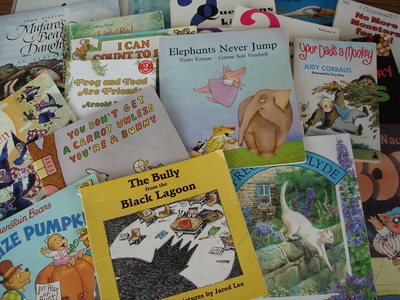
This year my eldest son have to read a book, written in English, each week. At beginning of year he had to buy an small book for children. Then, every week, he swaps the book with another classmate. In this way, my son and I are reading a different book and we are learning something each week. It seems to me something good. It is a very good way to instil the reading into the children. The reading in English, of course.
The same happens with my youngest son, but they have to swap the book each fortnight.
Then, they have to hand over to the teacher a summary and a list of some difficult words.
Some examples: The Milky Way, the solar system and the planets; The penguins and the race of south pole (the story from Scott and Amunsend); King Arthur, etc.
I am enjoying a lot and at the same time everyone are learning.
This year my eldest son have to read a book, written in English, each week. At THE beginning of year he had to buy A small book for children. Then, every week, he swaps the book with another classmate. In this way, my son and I are reading a different book and we are learning something each week. It seems to me something good. It is a very good way to instilL A LOVE FOR reading into the children. The reading in English, of course.
ReplyDeleteThe same happens with my youngest son, but they have to swap the book each fortnight.
Then, they have to hand over to the teacher a summary and a list of some difficult words.
Some examples: The Milky Way, the solar system and the planets; The penguins and the race TO THE south pole (the story OF Scott and Amunsend); King Arthur, etc.
I am enjoying IT a lot and at the same time everyone IS learning.
That's a great way to practice, Eduardo. Do you also discuss the book? "Swap" and "instill" are good verbs. Besides the corrections above, you also made a simple mistake in conjugation that I left uncorrected. Can you find it?
This is a difficult test for me. I'm a dreadful student and I am used to use my intuition. That thing of analyze what I do, I think it doesn't go very well with me. I think I am a very impulsive and temperamental person.
ReplyDeletePerhaps "I am enjoying it a lot" should be "I enjoy it a lot", because is something which I do along all year not only "in this moment". I don't know. It's possible that now they be, at least, two mistakes.
I anxiously hope your grammar lesson and I also hope it doesn't fall on deaf ears.
As for what to discuss, each book becomes in a class either history, physical / human geography, astronomy... etc. and my sons, apparently, enjoy it a lot and tell me everything they are learning in class and outside class. In Spain we would say: We kill two birds from a shot.
Sorry, I didn't mean to give you a trial. The simple mistake/correction was: This year my eldest son haS to read a book...
ReplyDeleteWe say "kill two birds with one stone" in English.
Very good! You see! I'm a bit slow at grammar. To quote just an example: last year in my oral English exam when I was talking about my brother Carlos, I said: He "has" forty years. In the same way, short before, in my "writing", I was so nervous that I didn't remember how to write "January" and I put down "Enuary". Then I explained it to the examiners and, thank goodness, everything left on laughter.
ReplyDeleteI think, this post also has served to kill two birds with one stone. In the future I hope to remember the correct use of the "third person".
And, by the way, I love trials. They are like the exercises we do in class. To answer your trial I had to revise my notes about verb tenses. If not it were...¿?... for these occasions, those notes would be gathering dust. Thanks for your trial. You can give me so many trials as you wish. It's very amusing.
How it's said "Si no fuera por..." in English?
I think "Si no fuera por..." = "If it were not for...".
ReplyDeleteFor example, "Si no fuera por ti, yo no podría vivir" = "If it were not for you, I couldn't live".
Note that the "were" is one of the few lingering usages of the subjunctive in English. These days many people would say "If it was not for you...", but I think "were" still holds sway.
Now you can look up "lingering" and "to hold sway"! :-)
Thanks for the explanation.
ReplyDeleteIt's a pity! a few days ago I read in a grammar book that "the subjunctive is already fell in disuse, at least in England. Few people use it. I like using the subjunctive since I heard the song: "If I were a rich man..." from the film "Fiddler on the roof". The song melody left engraved on my memory.
I knew "linger" and "lingering"... Who knows?... perhaps this word was used talking about subjunctive in the paragrah which I read.
Regarding "to hold sway", I knew, for example", leaves swaying in the wind... but... the meaning of "to dominate"... you make wonders with the phrasal verbs.